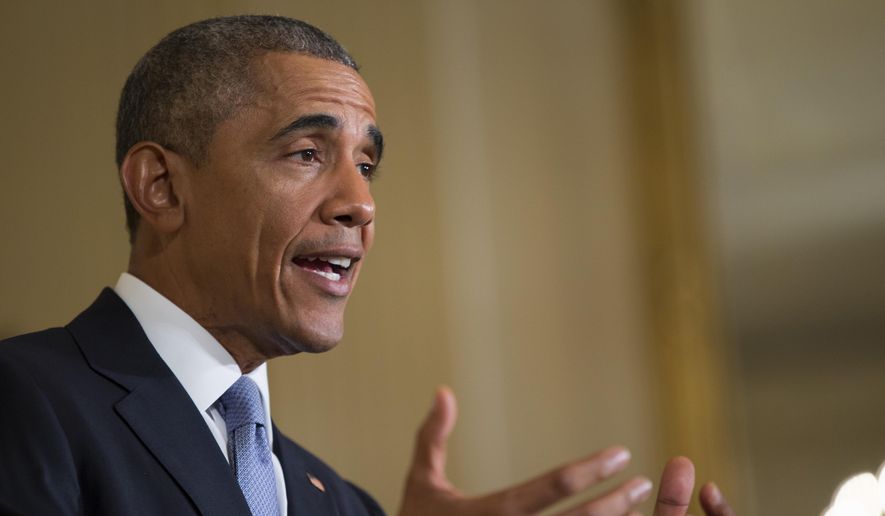President Obama two years ago thought both Congress and the American public were ready for a real discussion about cutting Social Security, but it’s now clear just how wrong that calculation was, as many of the president’s fellow Democrats have gone in the other direction and are pushing to expand the entitlement program.
Mr. Obama’s controversial proposal to cut Social Security was spelled out in his fiscal year 2014 budget, released in early 2013. The spending plan called for the implementation of “chained CPI,” which would have changed how Social Security benefits are calculated and reduced government payouts over time.
The idea, analysts say, was born out of the belief that the president and congressional Republicans may have been able to strike a sweeping deal that addressed both government spending and entitlement programs. Mr. Obama’s chained CPI proposal was seen as an olive branch to Republicans in that broader effort, a sign he was willing to take criticism from the left in the hopes of securing an agreement with the GOP.
But the chained CPI plan quickly fell by the wayside, and the president didn’t mention it during an address Monday that focused on issues affecting older Americans. He made only a passing reference to the solvency of Social Security.
“Here’s the truth: Medicare and Social Security are not in crisis, nor have they kept us from cutting our deficit by two-thirds since I took office,” Mr. Obama said at a White House conference on aging. “We need to keep Social Security strong, protecting its future solvency. And I think there are creative ways to protect its future solvency but also strengthen retirement security for our most vulnerable neighbors. That’s step No. 1.”
The president’s “creative ways” comment could be seen as a reference to chained CPI, but analysts and activists say the White House rightly has recognized that the political winds are blowing in a much different direction than they were two years ago, and there’s little appetite for tackling even minor Social Security reforms.
SEE ALSO: Rick Santorum: Immigration should be at forefront of 2016 GOP race
“President Obama has heard clearly from the American people that they absolutely reject any proposal to cut their earned benefits. What we need to do is enhance, expand Social Security, which is the foundation, the rock, people can count on for their retirement,” said Alex Lawson, executive director of Social Security Works, a group that advocates for expanding the entitlement program.
The organization and other activist groups on Monday delivered a 2.5 million-signature petition to Mr. Obama calling for enhancements, not cuts, in Social Security.
High-profile Democrats, including the party’s leading presidential candidates, have called for the same thing.
Hillary Rodham Clinton on Monday said she’ll be “defending and enhancing” Social Security if elected president. Sen. Bernard Sanders, Vermont independent running as a Democrat, has been a leading voice for expanding the program.
Former Maryland Gov. Martin O’Malley also has made Social Security a focal point of his campaign.
Mr. O’Malley has “been very specific about other steps we need to take rebuild the American dream. He’s called for raising the minimum wage to $15 an hour, expanding Social Security, and taxing capital gains at the same rate as earned income,” O’Malley deputy campaign manager Lis Smith said in a statement.
SEE ALSO: Scott Walker vows to turn back clock on taxes to Reagan era
In another bid to repair relations with his party and with older Americans, Mr. Obama has asked the Labor Department to crack down on conflicts of interest in the retirement savings advice people may get from financial advisers. He’s also put forward proposals to expand access to employer-based retirement savings accounts, The Associated Press reported.
Political specialists say Mr. Obama’s decision to abandon Social Security cuts was, at first, a recognition of political reality. Now, they say he’s avoiding the issue both to help secure his own legacy as a liberal leader and to aid Democrats who may succeed him in the Oval Office.
“Barack Obama is not wanting to jeopardize his recent legacy description of him being a progressive and standing by progressive goals. I see this as him recalibrating his priorities to ensure that any future Democratic candidate is not essentially on the defensive on this issue,” said Lara Brown, a political science professor at George Washington University. “I think Barack Obama is thinking about his legacy and I think the most important thing for him, he has decided, is he wants to not appear is if he were a compromising, triangulating president, which is that prior [chained CPI] proposal would have led him toward.”
• Ben Wolfgang can be reached at bwolfgang@washingtontimes.com.




Please read our comment policy before commenting.